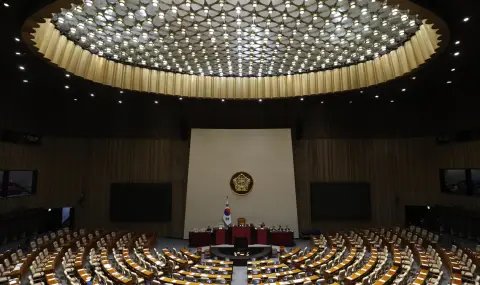Today December 7, 2024 The National Assembly of the Republic of Korea (unicameral parliament) will vote to impeach the country's president Yoon Suk Yeol.
The Republic of Korea (ROK) is a presidential republic in its form of government. Yoon Suk Yeol, a member of the conservative Civic Power Party, was elected president on March 9, 2022. and took office on May 10. He came to power when the National Assembly (unicameral parliament) was controlled by the Toburo Democratic Party, which after the 2020 elections. had 180 parliamentary seats out of 300. After the April 2024 parliamentary elections, during which "Toburo" got 171 seats, and "Civil Power" 108 seats, the confrontation between president and parliament continued.
In recent months, the president and the ruling “Civil Force” met with resistance from the opposition, which succeeded in removing some cabinet members and delayed the adoption of the budget bill. So opposition lawmakers pushed a draft budget through a parliamentary committee, reducing the president's proposed 677 trillion won budget plan by 4.1 trillion won ($2.8 billion). In particular, the costs of the work of the government and the office of the president, the prosecutor's office, the police and the state audit agency were reduced. In addition, the opposition criticized the granting of a loan to Ukraine (approximately 3 trillion won, or 2.1 billion USD).
December 3, 2024 Yoon Suk Yeol announced the introduction of martial law in the country - all political activity is prohibited, including the work of parliament and parties, as well as protests, strikes and strikes (the last time martial law was introduced in 1979).
He motivated the decision by the fact that the opposition paralyzes the work of the executive power. “Our National Assembly has become a haven for criminals, a den of legislative dictatorship that seeks to paralyze the judicial and administrative system and overthrow our liberal democratic order,”, the president said. The leader of the Democratic Party "Toburo" called the declaration of martial law "illegal, unconstitutional and anti-people" (according to the law on martial law, the president is obliged to immediately convene a session of the National Assembly when declaring it).
On the same day, members of parliament (those who managed to enter the cordoned off parliament building) unanimously passed a resolution calling for the lifting of martial law - 190 MPs, including representatives of the president's party, voted "For" .
According to article 77, paragraph 4 of the constitution, the president is obliged to obey the decision of the parliament. Martial law was eventually lifted less than six hours after it was declared. Opposition parties demanded Yoon Suk Yeol resign, threatening impeachment. Later, the leader of the ruling "Civil Force", who previously held a pro-presidential post, joined the call. Han Dong Hoon. As a reason, he cited evidence that on the day martial law was declared, the president tried to use counterintelligence services to “arrest key politicians”. countries, which he called “anti-state forces”. But the party itself refused to officially support the impeachment of Yoon Suk Yeol.
The opposition has 192 seats out of 300 in the parliament and in order to remove the president from power, it needs 8 more votes from representatives of the ruling party.
This morning the president apologized to the people of the country for his decision to introduce martial law and assured that he will not repeat the situation.
According to the results of a public opinion poll conducted by polling company Gallup Korea on December 3-5, Yoon Seok Yeol 's approval rating fell to a record 13% following the imposition and lifting of martial law . On November 29, it was 19%.
The impeachment procedure in the Republic of Korea is provided for in the 1987 constitution. In accordance with Art. 65 of the basic law, the president, prime minister, ministers, judges, members of the Central Election Commission and members of the Audit and Audit Commission, as well as other officials may be removed from office. The National Assembly has the exclusive right to initiate the procedure for removal from office. If an indictment is brought against the president, at least half of the deputies must make a motion for impeachment. In order to approve an impeachment, the support of two-thirds of the total number of deputies is required (for the removal of other officials, half of the parliamentarians' votes are sufficient).
The final decision to remove from office comes into force after approval by the Constitutional Court, the consent of at least six of its nine members is required for a decision. Consideration of the matter in the Constitutional Court usually takes several months (up to 180 days). During this time, the president is removed from power, and his duties are performed by the prime minister. If the Constitutional Court recognizes the legality of the impeachment request, then criminal proceedings may be initiated against the official.
The first impeachment proceedings against a president in South Korea began in 2004. The National Assembly then voted to oust President Roh Moo-hyun, who was elected in 2002. He was accused of attracting illegal sources of funding during the election campaign. On May 14, 2004 however, the Constitutional Court rejected the parliamentary initiative and reinstated Roh Moo-hyun. He remained in office until his term expired in 2008. In 2009, after new accusations of corruption, Roh Moo-hyun committed suicide.
